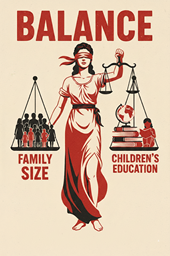by Ron Raskin

One of the three main points in the new Western doctrine is the need to increase birth rates in Western democracies. This is seen as a way to strengthen society and better prepare Western democracies for the long struggle against growing challenges, especially Islamism. More details are explained below in a Q&A format.
Q: How can we build a liberal society with higher fertility?
There are a few possible approaches. The simplest—but least desirable—would be to roll back many achievements of modern liberal society, such as sending women back to the role of housewives or limiting education to elites. But instead of undoing progress, we should find a new path: one that preserves what we’ve gained over the last century while adapting it to today’s needs.
This new path should combine two goals: higher fertility and the best possible education.
How could this work in practice? Each nuclear family would receive points based on two factors: the number of children they have and how well those children succeed in education. Think of it as a kind of affirmative action, but with a different aim. Instead of disadvantaging families that already value education, it would encourage those who don’t yet prioritize it—while also creating a healthy balance between family size and educational success.
Families who want their children to succeed would need to invest not just in the education of one child but also in raising more children. Those who manage to achieve both—larger families and strong education—would benefit the most.
Q: Why is this needed?
Right now, there are two completely separate approaches:
- Government policies to support large families: Governments give support to families with many children. But this often doesn’t encourage those families to invest in education. Instead, it increases the share of society that lives on government payments without motivation to contribute back.
- Personal success and self-fulfillment-oriented families: Other families focus on giving their children the best education and opportunities. But because of competition and limited resources—both time and money—they often choose to have fewer children.
By connecting these two worlds, we create a new social contract: one where families are encouraged to have more children and prepare them to contribute more to society. This also helps reduce tension between groups focused on higher fertility and those focused on careers and achievements.
Q: What exactly counts as a “nuclear family” here?
A family nuclear means a couple with all their children under the age of 35. Each person can belong to only one family.
- Example: A 36-year-old man with no children counts as his own family, separate from his parents and younger siblings.
- A 30-year-old man with children can choose to start his own family unit earlier than 35 if it gives him and his children more social points.
- If a couple separates and each partner starts a new relationship, they can become part of multiple families. In that case, the person receives the maximum points available among the nuclear families they belong to.
Q: What benefits do the points give?
There are two main types:
- Social benefits: Priority for spots in schools and universities, government jobs or tenders, faster service in government offices, and even access to special road lanes (like those for public transport).
- Financial benefits: Direct government payments based on family points. These payments are divided between parents and their children under 18, as well as each child aged 18 to 35.
Q: How are the points calculated?
Points depend on two things:
- The number of children in the family.
- How those children perform in the education system.
A family with many children but poor educational results will have low points. A family with only one or two children who excel in education will also have low points. The highest points go to nuclear families that manage to balance both: more children and strong education.

